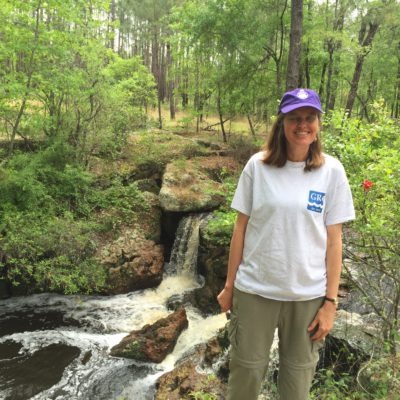The Dancing Star Foundation is pleased to introduce its 2016 Research Fellow, Dr. Melanie DeVore:
Dr. Melanie DeVore received her Ph.D. in Plant Biology at Ohio State University. She was an Assistant Professor of Biology at Sam Houston State University and currently is the Georgia Power Endowed Chair in Environmental Science and a Professor of Biological and Environmental Sciences at Georgia College, an adjunct faculty member in Science and Society at Arizona State University, and is affiliated with the Paleontology Division of the Burke Museum, University of Washington.
DeVore has published numerous papers pertaining to extant and fossil plant biology. She has done extensive fieldwork in Canada and the United States in addition to her dissertation research in the Andes of Argentina and Chile. The common thread of most of this work has been the origin and evolution of flowering plants into high elevation habitats and temperate climates. DeVore has been an invited speaker in symposia at national and international meetings and is an active member of the American Society of Plant Taxonomists and the Botanical Society of America. She is a Past President of the Georgia Academy of Science.
The influence of hundreds of students, along with extensive teaching responsibilities to cover courses in ecology, environmental science, evolution, and systematics, stimulated an innate tendency for DeVore to dovetail active conservation with the classroom. Since 2000 she has worked with more than 300 students on conservation themed courses and projects in the Bahamas. She currently volunteers her services to the annual Teacher Workshop and San Salvador Island Seacamp operated by the Bahamian Reef Environmental Education Foundation. DeVore is on the Board for San Salvador Island Living Jewels and has contributed to that group’s charge of establishing national parks and marine protected areas on the Island.
Locally, in Georgia, Dr. DeVore has utilized the 540 acres of property associated with author Flannery O’Connor’s Milledgeville home –Andalusia- to engage both the general public and Georgia College students in exploring and connecting with biodiversity in their own region.
Dr. DeVore also serves the Stonerose Interpretive Center & Eocene Fossil Site in Republic, Washington as a science adviser and is a co-author of the guidebook the Center uses for identifying fossil plants. Each year DeVore contributes talks to opening weekend or National Fossil Day, and helps curate the Center’s fossil collection and field sites.
In 2015 Dr. DeVore traveled to Rwanda, as a guest of the Dian Fossey Gorilla Fund International, to visit the iconic mountain gorillas. Immediately the planet’s “biggest botanists” triggered an interest in Dr. DeVore in the way our own species perceive plants. Gorillas have a deep knowledge of plants, and thus, can humans really be “plant blind”? This question is one that intrigues DeVore. A recent visit to Karisoke Research Center has prompted Dr. DeVore to volunteer with their Memoirs Program and provide expert guidance and resources to University of Rwanda botany students to connect with their own flora. One of Dr. DeVore’s critical questions for study and activism, spans numerous ecological disciplines. How best to utilize botanical empirical data to help save an iconic, critically endangered species? In this case, that would be the mountain gorillas, whose numbers are down to fewer than 1,000 individuals. With in-depth botanical knowledge, and the training of the next generation of young Rwandan scientists, perhaps there are non-invasive approaches to saving these remarkable fellow beings who inhabit three adjoining national parks: Volcanoes National Park in Rwanda, Virunga National Park in the Democratic Republic of Congo, and Mgahinga Gorilla National Park in Uganda.
With its emphases on international global conservation, animal protection and environmental education, Dancing Star Foundation is very pleased indeed to announce its 2016 Dancing Star Foundation Research Fellow, Dr. Melanie DeVore.
Learn more about Dr. DeVore, her work, and the DSF Research Fellows here. The Dancing Star Foundation is an active node of the MAHB.
The views and opinions expressed through the MAHB Website are those of the contributing authors and do not necessarily reflect an official position of the MAHB. The MAHB aims to share a range of perspectives and welcomes the discussions that they prompt.
